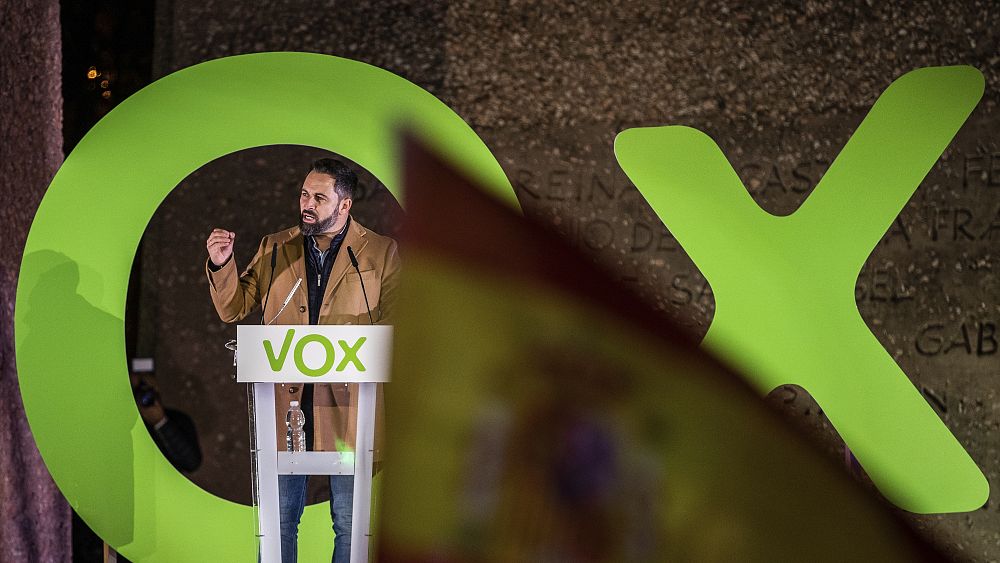From Catalonia to the crises: Why is the far right growing in Spain?

With polls predicting victory for the right-wing Popular Party, a future national government that includes Santiago Abascal’s party is more than likely. Its growth is the result of several factors, and can be traced back to the push for Catalan independence in 2017.
Long gone are the days when Spain was one of the few oases in Europe without a far-right presence in its institutions. But since the 2019 general elections, the Vox party holds 52 of the 350 seats in the Congress of Deputies.
With polls giving victory to the right-wing Popular Party (PP), a future national government that includes Santiago Abascal’s Vox, which is expected to win about 13 per cent of votes, is more than likely.
“The Popular Party has managed, thanks to its pact with Vox, to make acceptable a force that was once absolutely marginal and had a kind of democratic cordon sanitaire around it,” says political analyst Verónica Fumanal.
Its growth is the result of several factors. To understand, we have to go back to the push for Catalan independence in 2017. The following year, Vox, which was established in 2013, began to make electoral gains.
“The whole Catalan pro-independence process was experienced throughout Spain as a very strong emotional shock, and Vox rode on the back of that emotionality, that reactivity,” says Fumanal.
Added to this was the Popular Party’s corruption scandals, which brought down Mariano Rajoy’s government through a motion of censure, which saw the Socialist Party come to power with the support of the extreme left and secessionist parties.
“This was obviously capitalised on by Vox because this is where we find one of their greatest enemies, what they consider to be the anti-Spain,” says historian and author of ‘Far Right 2.0’, Steven Forti.
Among these “enemies”, says Forti, are not only nationalism and independence, but also “everything connected to the United Nations’ Agenda 2030, the rights of minorities, and feminism”, which Vox regularly attacks in its speeches and electoral programme.
But there are other elements that analysts see as key to the rise of the far right in Spain. Fumanal refers to technological changes that are “causing a new cleavage, not only left-right, not only nationalist-non-nationalist but also, for example, rural-urban”.
It is also fed by a fear of the unknown, which “always has a nostalgic movement behind it”, and the poor socio-economic situation.
“The social elevator has been quarantined. Today, a young person who is better educated than his or her parents is not guaranteed to live better than them. This social contract is what allows populist forces to engage and connect with young people as well,” says Fumanal.
A ‘whitewashed’ populist discourse
“Every successful discourse has small connections with reality,” says Fumanal. She says Vox uses errors such as the “law of the only yes is yes” which allowed the reduction of sentences for sex offenders as a “weapon of war”.
It can do so with complete freedom, according to the political analyst, because “populism has no ethical or moral limitations, nor any commitment to the truth”.
This political communication is carried out through “B2B channels that are not controlled, generating watertight communities that are not ashamed, communities that feed off each other and are increasingly large because they do not have the element of contrast”. Their aim, in Fumanal’s words, is “to inoculate, not to inform”.
The process of these extremist discourses taking hold in Spain has been gradual and has had to do with the approval of the traditional right.
“Of course, Vox has been whitewashed. Not only after the elections in Andalusia,” argues Steven Forti.
For the historian, the turning point in the PP’s attitude was its presence, together with another political party, Ciudadanos, and Vox in a joint demonstration in Madrid’s Plaza Colón against socialist Prime Minister Pedro Sánchez’s government.
“Spain never had what is called a cordon sanitaire or democratic cordon in the face of extreme right-wing forces,” Forti points out. Something that materialised after the municipal and regional elections of 28 May 2023 with government pacts between PP and Vox.
Alberto Núñez Feijóo’s PP party signed governability pacts in coalition with Vox in 135 town councils throughout Spain that “largely buy some of Vox’s programmatic points”.
The consideration of the far right and its ideology as something “democratically acceptable”, says Fumanal, has also been contributed to by certain media, “because there are certain powers that consider that the right must come to power, and for the Popular Party to do this, it needs a springboard, which is Vox”.
The European extremist wave
Spain is one of the latest countries to join this move to the far right, which has been seen in both Europe and the United States, and which, according to Steven Forti, is in response to the increase in socio-economic inequalities, the so-called “cultural reaction” to social changes or immigration, and the crisis of liberal democracies. The ‘firewalls’ against extremist discourses have collapsed in recent decades, and disaffection with democracy has helped one that exploits fear to take hold.
Looking ahead to the European elections in June 2024, the EU is fearful of the effect that a Popular Party coalition government with Vox in Spain could have. In addition to reinforcing the ultra-conservative wave experienced in Europe since elections in Italy, Sweden, Finland, and Greece, Forti says this would open the door to the “possibility of a future alliance after the next European elections between the European People’s Party and European conservatives and reformists”.
“The extreme right-wingers have all repositioned themselves, so they are not talking about Brexit, Frexit, or Italexit. However, none of them are in favour of greater European integration”, says Forti. Vox, like the party of Italian Prime Minister Giorgia Meloni (Fratelli d’Italia), advocates a halt to European integration and the recovery of national sovereignty.
But how much can this extremist wave continue to grow? Fumanal believes that when these parties come to power, they do not focus on issues that affect citizens.
“It is an identity war, not an ideological one,” she says. “Therefore, when they have governed, they are not re-elected. Trump wasn’t re-elected, Bolsonaro either, and we’ll see if Meloni is re-elected. Only in countries where these beliefs are really embedded in society, such as Poland and Hungary, do governments like this persist”.
Source: Euro News















